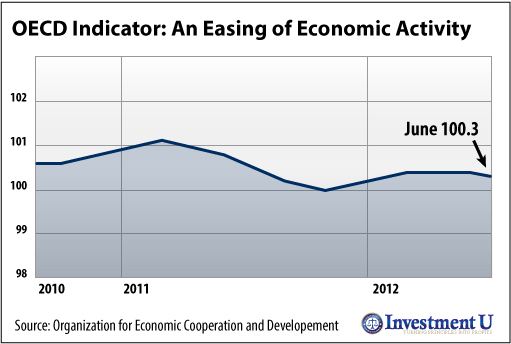Article by Investment U
In this age of endless information and media exposure, we get overwhelmed by reports and studies from all types of organizations and statistics referred to only by some crazy acronym –the IMF, ECB, PMI… The list goes on.
Believe it or not though, some of these reports and organizations actually give us good stuff. And acting on the right information can help build wealth. One such came report came out about two weeks ago and what it said could weigh in on your portfolio choices for some period of time.
You may have seen news referring to the OECD acronym sometime around the second week of August. The Organization for Economic Co-operation and Development (OECD) is a global economic organization of 34 countries founded in the early 1960s with a stated mission “to stimulate economic progress and world trade.”
The OECD over the last decade has been attempting to define and separate itself from all those other international acronyms. They seem less concerned with the theories of international macroeconomics or lending money to debt ridden countries. They try to get down to the “nitty gritty” and talk about agricultural and/or educational reform. As one former Secretary General stated, they would rather be “a steering group for the world economy.”
What does this mean for you? In a nutshell, the OECD has some great international economic stats. More importantly, they have been pretty reliable in predicting economic trends.
The OECD Sees a Slowdown Ahead
According to the OECD’s composite leading indicators (CLIs) of economic activity, most of the developed economies are probably going to slow. These indicators are set up to give early signals of turning points between times of boom and bust. Here are how they’re made up:
• You have “early stage” indicators which look at what’s going on in the initial stages of production like construction approvals
• Then you have “rapidly responsive” indicators which respond in a timely manner to changes in the economic landscape. An example would be stock market indices.
• “Expectation-sensitive” indicators would reflect qualitative reports and measures like consumer confidence.
• Finally, “prime movers” indicators are related to monetary policy and foreign trade
The OECD reported August 8 that its leading indicator fell to 100.3 in June from 100.4 in May. This leads us to believe that there will be “an easing of economic activity.”
What Does it Mean to Me?
The OECD’s findings haven’t put the world on its head because we’ve pretty much known this information for quite some time. What it does, however, is give more credibility to what we thought we knew.
In response, there has been a move lately for investors and some fund managers to take a longer look at emerging-market stocks. They are looking more specifically at stocks that are tied to their own domestic consumer growth. The object of this strategy is to take advantage of emerging market growth that isn’t too highly dependent upon demand from Europe and other developed declining economies.
According to Roger Edgley, lead manager of Wasatch Emerging Markets Small Cap Fund (WAEMX), Small-caps in emerging markets “are less risky than large caps and have less exposure to the developed markets… Developed markets have actually gotten riskier, if you look at debt to GDP, bank stress, and fiscal stress.”
Edgley likes companies with consistent growth over time and here are five of his favorites in WAEMX:
• Colgate-Palmolive India Ltd. (BOM:500830) is a separately traded unit of well recognized Colgate-Palmolive and it is taking advantage of a blossoming domestic consumer market in India.
• LIC Housing Finance Ltd. (BOM:500253) is a part of India’s largest insurer. It provides loans for purchase, construction, repairs and renovation of houses to individuals, corporations, builders and co-operative housing societies.
• Cleanaway Co. Ltd. (TPE: TW:8422) would fall into Warren Buffett’s “Moat Strategy”. It’s a Taiwanese hazardous waste treatment and management company and this industry has high barriers to entry.
• Discovery Holdings Ltd. (ZA:DSY) is a leading insurer in South Africa which provides insurance products and financial services to employer groups and individuals. They have a range from South Africa to Great Britain China, and the U.S…
• Dah Chong Hong Holdings Ltd. (HKG: HK:1828) is a is a Hong Kong-based conglomerate that deals in motor vehicle sales and repair, air cargo equipment distribution, cosmetic, airport ground support equipment maintenance, food, logistics and warehouse services. Edgely believes that the company can grow even under the threat of a further global meltdown.
If you don’t want to invest individually or can’t invest in foreign stocks with your broker, the Wasatch Emerging Markets Small Cap as of about a week ago is up nearly 15% for 2012. Morningstar also puts it in its top 2% of its Diversified Emerging Markets class. If you look at the annualized return for the last three years, WAEMX is up about 21%.
But this is just one way to hedge against economic slowdowns in the “developed” world. Stay tuned for more quality emerging market plays from our experts in the weeks ahead.
Good Investing,
Jason Jenkins
Article by Investment U
